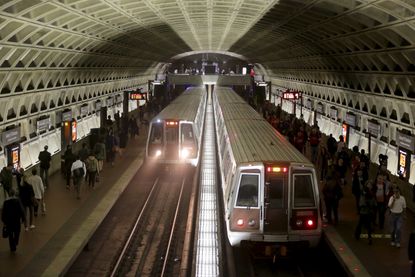How to do infrastructure spending the right way
A few ideas for real, useful projects we should invest in for the betterment of the country


In many ways, Washington, D.C., is like a fantasy land. Sometimes there are seemingly magic words that, when spoken, yield a magical effect. One example? "Infrastructure spending."
Politicians love infrastructure spending. Hillary Clinton has a $275 billion infrastructure spending plan. Donald Trump, never to be outdone, wants $500 billion. President Obama's post-2008 stimulus package included a significant component of infrastructure spending. Progressives love it, and while conservatives tend to be queasy about any sort of non-essential government spending, this is the kind they dislike the least.
But while politicians love the idea of infrastructure spending, they tend to disagree about how to do it. Conservatives are often too concerned with the ideological case against government excess, important as it is, to focus on the actual nuts and bolts of government. And as Bloomberg View's Megan McArdle points out, progressives tend to view infrastructure projects as a way to provide low-skilled workers jobs, but most of the jobs are actually high-skilled, even in the trades.
Subscribe to The Week
Escape your echo chamber. Get the facts behind the news, plus analysis from multiple perspectives.

Sign up for The Week's Free Newsletters
From our morning news briefing to a weekly Good News Newsletter, get the best of The Week delivered directly to your inbox.
From our morning news briefing to a weekly Good News Newsletter, get the best of The Week delivered directly to your inbox.
Progressives' version of infrastructure spending all too often resembles Keynes' semi-serious recommendation that, during the Great Depression, governments pay workers to dig big holes and then fill them up again, because even though the work itself would be worthless, giving people extra paychecks would still pump money into the economy. While Keynes may have been right about that in the context of a massive economic depression, America's economy, while not great (again), is by no stretch of the imagination in a depression where wasteful infrastructure spending would still be worth it because of its direct stimulative effect.
A major impediment to infrastructure spending is the lengthy and punctilious environmental review process, exactly the sort of annoying regulation championed by — you guessed it — progressives. And they often have a bizarre fascination with projects like high speed rail that don't really make sense in America. And then there are things like union rules and "Buy American" rules that only make projects more expensive and less efficient.
There's a lot to improve about America's infrastructure, but in the real world there's very little reason to think that an infrastructure plan by the Clinton administration, colonized as it would no doubt be by special interests, would be much more than an expensive waste.
While everyone agrees we need better "infrastructure," there's no substantial conversation about what, specifically, we need, and why. "Infrastructure spending" is a magical phrase in Washington, indeed: It makes hard questions disappear in an impressive but vaguely foul-smelling puff of red and blue smoke.
So, what should we do? Here are a few pointers.
The internets! The one place where America's infrastructure most inexcusably lags is high speed internet. This is the country that literally invented the internet, and where most of the value created and extracted from the internet is created and extracted. Technologically speaking, there's no valid reason why America couldn't be like South Korea, where very high speed broadband, both wired and wireless, has become so pervasive that their internet is completely different from our own and bringing up one of their websites is like trying to watch a YouTube video on dialup. The problem is political: American telecommunications firms are basically an oligopoly, and oligopolies don't feel much pressure to provide a great service.
Nukes! Nuclear power is the best form of power there is. It's clean. It's safe. It's long-lasting. It just works. Unlike solar, it works even at night. Unlike coal, it doesn't destroy the Earth. Unlike oil, it doesn't fund terrorists. It's just perfect. In the 1960s and 1970s, France decided to get most of its energy from nuclear, and as a result reaped countless benefits — economic, environmental, and technological. A lot of people are rightly talking about how to bring back blue collar jobs and compete with China. Well, after labor, the biggest cost in manufacturing is energy. Very cheap nuclear energy wouldn't bring back all those jobs, of course, but it sure would help.
Research innovative infrastructure ideas. A lot of people, including Hillary Clinton, talk about an "infrastructure investment bank," which sounds kind of appealing, kind of business-y, kind of national-y, but always ends up being cronyist nonsense. If I'm going to use a buzzword, how about this: a "DARPA of infrastructure." Did you notice Elon Musk came up with the idea of the Hyperloop, a potentially revolutionary kind of high rail system? Did you notice that Facebook is working to beam high speed internet everywhere from satellites? Speaking of nuclear, there are lots of very promising ideas — like pebble bed reactors and thorium — that don't get explored because political skittishness has killed nuclear R&D.
Another Washington phrase that gets thrown around a lot is "21st century infrastructure." But what we really mean when we say that is usually just a better version of existing 20th century infrastructure: faster trains, fancier highways. Twenty-first century infrastructure ought to be something completely different. But before it can come to fruition, somebody needs to invent it.
First, let's tackle the projects I've just mentioned, then we'll be off to a very good start. No magic. Just useful infrastructure.
Sign up for Today's Best Articles in your inbox
A free daily email with the biggest news stories of the day – and the best features from TheWeek.com
Pascal-Emmanuel Gobry is a writer and fellow at the Ethics and Public Policy Center. His writing has appeared at Forbes, The Atlantic, First Things, Commentary Magazine, The Daily Beast, The Federalist, Quartz, and other places. He lives in Paris with his beloved wife and daughter.
-
 Can AI tools be used to Hollywood's advantage?
Can AI tools be used to Hollywood's advantage?Talking Points It makes some aspects of the industry faster and cheaper. It will also put many people in the entertainment world out of work
By Anya Jaremko-Greenwold, The Week US Published
-
 'Paraguay has found itself in a key position'
'Paraguay has found itself in a key position'Instant Opinion Opinion, comment and editorials of the day
By Justin Klawans, The Week US Published
-
 Meet Youngmi Mayer, the renegade comedian whose frank new memoir is a blitzkrieg to the genre
Meet Youngmi Mayer, the renegade comedian whose frank new memoir is a blitzkrieg to the genreThe Week Recommends 'I'm Laughing Because I'm Crying' details a biracial life on the margins, with humor as salving grace
By Scott Hocker, The Week US Published